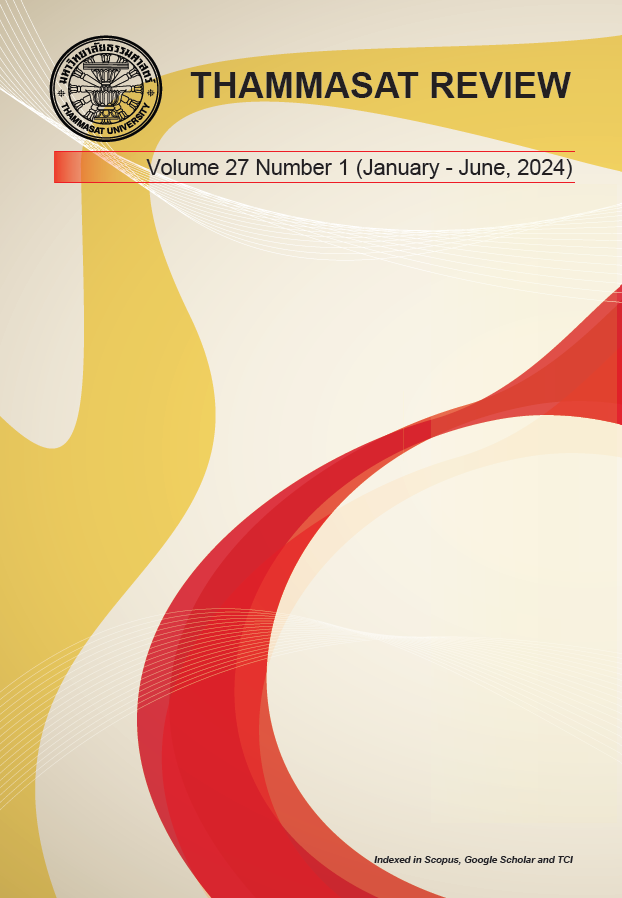Developing a Model for Promoting Social Enterprise for Entrepreneurs with Disabilities in Thailand
Keywords:
Social Enterprise, Entrepreneurs with Disabilities, Social Enterprise Business Plan, Model for Promoting Social Enterprise for Entrepreneurs with DisabilitiesAbstract
In Thailand, there are approximately 4.19 million persons with disabilities. Most of them (35%) are of working age. These individuals are engaged in entrepreneurship in the agricultural and services. The aim of the study is to change persons with disabilities from being "receivers" of assistance to being "providers" in economic and social development. Therefore, this study uses quantitative and qualitative methods. This study used surveys, focus groups, and case studies. Participants were entrepreneurs with disabilities who registered and not yet registered as social enterprises, and experts from the public, private, and academic sectors. The findings indicated that entrepreneurs with disabilities faced the highest level of need in building confidence. The problems reported were linked to training, legal/policy, and societal attitudes towards persons with disabilities. The model for promoting social enterprises for entrepreneurs with disabilities in Thailand by the Unit of Social Enterprise Incubator for Persons with Disabilities (USEID) consisted of four parts: leadership, training center, networking, and fund coordination. The findings suggest the need to enhance business and reduce taxes produced by persons with disabilities.
References
Awang, K., Buanak, M., Cheteh,S., Chatree, R., & Parinyasutinun, U. (2017). Operation of Social Enterprises in Hanthao Community, Pak Phayun District, Phatthalung Province. Journal of Humanities and Social Sciences Mahasarakham University, 36(4), 15 – 25.
Caldwell, K., Harris, S., Renko, M. (2019).Inclusive management for social entrepreneurs with intellectual disabilities: “how they act”. JARID.
Diochon, M., & Anderson, A. (2010). Ambivalence and ambiguity in social enterprise; narratives about values in reconciling purpose and practices. Springer.
Faculty of Business Administration University of the Thai Chamber of Commerce. (2018). Project to promote and develop the quality of life of Thai people with disabilities. Developing business potential for disabled organizations, Mini MBA for Social Enterprise course for disabled organizations, Class 1. [Unpublished document]. University of the Thai Chamber of Commerce.
International Labor Organization. (1983). Convention Concerning Vocational Rehabilitation and Employment (Disabled Persons). Geneva.
King Prajadhipok's Institute. (2016). Social enterprise education in Thailand: promotion of the public and private sectors. Advanced certificate course. Public Administration and Public Law, Class 15. [Unpublished document] Copyright of King Prajadhipok's Institute.
Maritz, A., & Laferriere, R. (2016). Entrepreneurship and self-employment for people with disabilities. Australian Journal of Career Development, 25(2), 45-54.
Maslow, H. (2013). Theory of Human Motivation. Martino Fine Books.
National Statistical Office. (2022). The 2022 Disability Survey. Printed by Social Statistics Division. National Statistical Office.
Parinyasuthinan, U. (2017). Social enterprise: Expanding community enterprise and community welfare. For managing the Thung Tam Sao community. Journal of Community Development and Quality of Life, 5(2), 353-364.
Peattie, K., & Morley, A. (2008). Social Enterprises: Diversity and Dynamics, Contexts and Contributions. Centre for Business Relationships, Accountability, Sustainability and Society (BRASS). Cardiff University.
Phasiphon, C. (2017). Evaluation of Social Return on Investment (SROI). Journal of Education, Chulalongkorn University, 45(4), 342 – 352.
Rojanawong, W., & Kongmalai, O. (2018). Developing guidelines to support social enterprise operations in Thailand. Academic journal Suan Dusit Graduate School, 14(1), 1-17.
Rozali, N., Abdullah,S., Jamaluddin, J., Ramil, A.J., Hussin, N.S., & Ahmad., A.Z. (2018). Promoting Social Entrepreneurship among Entrepreneur with Disabilities in Contribution for Community. EDP Sciences
Saebi, T., Nicolai Foss, N., & Linder, S. (2019). Social Entrepreneurship Research: Past Achievements and Future Promises. SAGE Publications.
Saiwut, S. (2021). Guidelines for creating entrepreneurs for the disabled group in pilot project Case study of Phra Nakhon Si Ayutthaya Province. Business Administration Journal Economics and Communication Naresuan University, 16(1), 77-102.
Sawadsri, A. (2009). The social model of disability and the perception of people with disabilities in Thai society. https://prachatai.com/journal/2009/09/25851
Shaheen, G. E. (2016). “Inclusive entrepreneurship”: A process for improving self-employment for people with disabilities. Journal of Policy Practice, 15(1-2), 58-81.
Siriphatthasopon, S. (2015). Study of the conceptual framework for the development of social enterprises in Thailand. Journal of the Researchers Association, 20(2), 113-143.
Social Enterprise Promotion Act 2019. (2019). National Office of Buddhism Printing House.
Sukkamnerd, D., Daengson, S., & Saringkarn, S. (2012). The path to creating independent careers for people with disabilities and social enterprises for people with disabilities. [Unpublished document] Health Systems Research Institute.
United Nation. (2007). Convention on the Rights of Persons with Disabilities. New York.
Wilber, K. (2000). Integral Psychology: Consciousness, Spirit, Psychology, Therapy. Shambhala.
World Health Organization and the World Bank. (2007). World Report on Disability. Geneva.
World Health Organization. (2010). Community-based rehabilitation Metrix: CBR Metrix. Geneva.
Downloads
Published
How to Cite
Issue
Section
License
Copyright (c) 2024 Thammasat Review

This work is licensed under a Creative Commons Attribution-NonCommercial-NoDerivatives 4.0 International License.
The opinions and ideas expressed in all submissions published in Thammasat Review are solely that of the author(s) and do not necessarily reflect that of the editors or the editorial board.
The copyright of all articles including all written content and illustrations belong to Thammasat Review. Any individuals or organisation wishing to publish, reproduce and distribute a particular manuscript must seek permission from the journal first.








